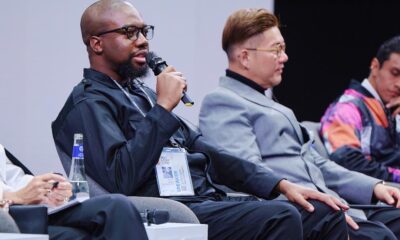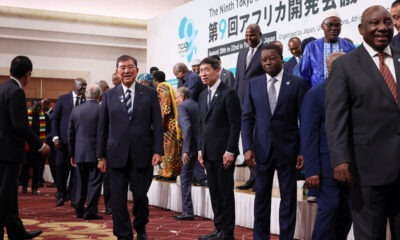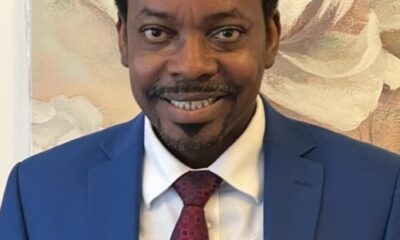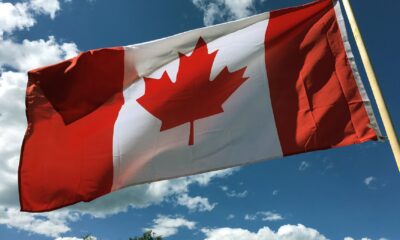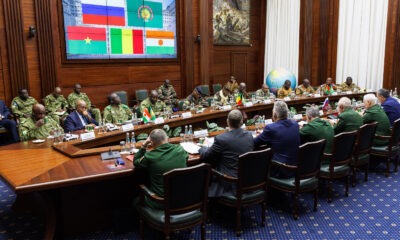Democracy & Governance
New Challenges Before The President -By Orji Uzor Kalu


Orji Uzor Kalu
The focus of this piece is to draw the attention of the president and, in fact, every concerned Nigerian to crucial national issues that should be of paramount focus to the continued existence and survival of our dear nation. For the benefit of clarity, these challenges are not new – they have always been with us. However, they have assumed a worrisome dimension since the present administration assumed office.
One truth that must be told is that Nigeria and, indeed, the entire global community, suffer downturn in the economy. This is exacerbated by the fact that the world is virtually at siege going by the war ravaging different continents. Worst hit is Africa where poverty and diseases have made life unbearable for the people.
It is amid these challenges that President Buhari’s government berthed. Contrary to the numerous promises he made during the electioneering, which heightened the expectations of the people, the economic and security situation has continued to pose a serious barrier to the actualization of those promises.
I am worried stiff that the economy has continued its downward trend, not helped by the dwindling oil prices that have thrown a spanner in the wheel of progress of the nation.
Even with all the realities on the ground some analysts have ceaselessly accused the president of being too slow. They may be right, judging by the high expectations of Nigerians. But what these analysts or armchair critics have failed to factor in is that Buhari assumed office on May 29, 2015 – barely 8 months, which is not enough time to achieve anything meaningful.
In his nation-wide campaign before the presidential elections he enunciated his vision for Nigeria. This vision was clear and unambiguous and stuck to Nigerians like fleece. The electorate had high hopes and keyed into the plan and voted massively for him.
One undisputable fact Buhari must always be conscious of is that Nigerians have reposed much confidence in him. They see him as the messiah that would take Nigeria out of its numerous socio-economic difficulties. It was this confidence that translated into the massive votes they gave him in the May 28, 2015 Presidential election. The spread of the votes also tells one story: Nigerians of all shades of opinion, religion and status spoke in unison for him to become their president.
Contrary to the general view that Nigerians expect too much from Buhari, I believe his Presidency will be the smoothest and most functional in the end. This is so because the litany of challenges facing Nigerians can be reduced to just six. These challenges should form the crux of all that he has set to accomplish. I have carefully articulated them after studying Nigeria’s peculiar social, economic and political parameters. There are six basic things generality of Nigerians need most; which when fixed will rub off on other sectors of our national economy. The first is electricity. Around steady electricity revolves almost all the other factors of production. There cannot be viable economic growth and substantial infrastructural development without fixing power. The current national installed capacity of less than 6,000 Megawatts is not even enough for Lagos and Abuja combined. New York City in America operates currently at an installed capacity of 45,000 Megawatts, which is the target that Nigeria is working to attain in the year 2020.
If we take into account the capacity of each of the existing power generating plants across the country, it is easy to understand why it is believed we are still very far away from meeting the electricity needs of the country. The late President Umaru Musa Yar’Adua was very ambitious about his plan to steady electricity generation and distribution before December 31, 2009. He tried his best to meet the 6000 megawatts target he set for his government. Three months to the deadline it was certain it could not be met. And no reason has been given till date why the government at that time could not meet the target.
When Goodluck Jonathan assumed office as President, one of his priorities was steady electricity. However, investigation has shown that the government did not have the infrastructural framework to achieve the target. It had thought that throwing raw cash into the system would facilitate its actualization. By the time it realized the huge mistake it had made the hawks in the sector had ripped it off.
As you read this article the current generation capacity nationwide is little above 4000 megawatts. This, coupled with low gas supply, is responsible for the epileptic power supply currently witnessed across the country.
It has to be pointed out though that electricity generation has always presented a huge challenge to the government because of its enormous cost in terms of materials and manpower. As at October last year grid electricity stood at 4920 MW. This was achieved due largely to the improved gas supply to the rehabilitated power plants across the country, importation of new electrical transformers, and increased water level at the hydro plants.
The integration of renewable energy as an alternative to the poor power supply in the country is a functional step towards addressing the problem. Renewable energy, apart from its cheapness and accessibility, is also environmental-friendly. On the whole, the two major sources of energy supply in Nigeria currently are thermo and hydro. While thermal contributes 67 per cent to grid, electricity hydro accounts for the balance of 33 per cent. Interestingly, many of the ongoing national electricity projects are thermal. But it would be nice if government can maximize the available huge gas, coal and lignite deposits to solve the endemic energy problem of this country. Once Buhari can fix electricity then he can be sure that unemployment, crimes, poverty, and diseases have been dealt a deadly blow. These social cankers thrive because there is no steady access to renewable energy. This should form one of the pillars of Buhari’s economic reconstruction package.
Next is education. Education is globally recognized as the key driver of any economy. A richly-educationally-endowed nation is the pride of the world. The United States, Britain, France, Germany and other developed economies are where they are because of the priority they have given to education. It is sad that Nigeria’s educational system is fraught with discrepancies and lopsidedness, which have accounted for poor standards over the years. The situation has got to such a worrisome level that graduates produced by tertiary institutions in Nigeria are regarded as substantially unemployable. The irony of the situation is that thousands of such graduates are turned out annually without any jobs for them. The danger in this development is that many of the graduates swell the rate of unemployment and crime.
Suffice it to add that the number of teachers in our schools is far below the number of students that need their services. This has thrown up a new great challenge to the government in the areas of teacher-education and training. This problem is more visible in the Universities that suffer from dearth of qualified lecturers. The establishment of more private universities and the increasing number of applicants for admission into the existing ones have aggravated the problem.
These are issues Buhari must address if he is to write his name in gold. I was privileged to have access to his vision for the educational sector and can claim, with some surety, that it is a well-articulated package that will reposition the educational sector if it is fearlessly and meticulously implemented.
The third area of interest should be agriculture. A nation that cannot feed its teeming population is not fit to exist. What is life if the generality of the population is hungry, sick and defenceless? It makes no sense to live then. It is pitiable that Nigeria with rich, expansive, arable land cannot boast of sufficient food for its teeming population. What is produced, mainly through subsistent farming, is not enough to go round. To augment government need to engage in massive food importation at huge costs on the national economy.
For instance, last year alone Nigeria imported food worth over N450 billion, when we have the capacity to produce enough food to feed our people. Who can tell me the rationale behind Nigeria’s massive importation of rice when our own rice is tastier? Government should find out why the numerous agricultural programmes such as FADAMA have not produced the desired results. Setting up a high-powered committee to work out modalities for the nation to attain self-sufficiency in food production should be given prime attention by the administration.
Internal security is one area President Buhari should focus on seriously. As things stand now life is vulnerable and brutish. Nobody is sure of living to the next day anywhere in Nigeria, because of the activities of hoodlums, robbers, assassins and other urchins who have made life unbearable for the people. Thank God the activities of Boko Harma have been cut down drastically. What happens to all the arms that were stockpiled by politicians for the 2015 elections? The rate of violence before, during and after the elections is worrisome. The activities of security agencies and politicians during the elections should be investigated to avoid future occurrences.
To restore professionalism and proficiency to the security agencies the President must take drastic steps to overhaul them and do away with those that have been shamelessly engrossed in politics and looting of public treasury. Nigerians are outraged by the ignoble activities of some top retired military brass involved in financial malfeasance and are being prosecuted by the Economic and Financial Crimes Commission (EFCC). There is no way a security agency can perform optimally if it is partisan and corrupt. Boosting internal security and professionalising our security agencies will attract more tourists to Nigeria and boost general security. The revenue from tourism can surpass that from oil if our tourism potentialities are fully harnessed.
Fighting corruption should tax the ingenuity of the new Buhari government. Fixing corruption will set the nation on a solid footing to attain other challenges of development. As things stand now all resources being invested in national development will go down the drain unless corruption is fought to a standstill. The Obasanjo administration did well to establish the Economic Financial Crimes Commission (EFCC) in 2002, but it lacked the political will to make it work. But along the way, it was turned into a terror-machine by the same administration to hunt down its perceived enemies. Toeing the same vindictive line as Obasanjo did is one temptation Buhari should avoid.
The failure of the EFCC to perform optimally is traceable to the way its operational platform is skewed. In fact, it was designed to tackle corruption bottom to top, instead of vice versa. I think with the generous support Buhari has received from Nigerians he is left with no other choice than to do what is right to deal a deadly blow on corruption. If he failed to fight corruption robustly, then he will be sure that his administration will end up in the annals of our dear nation as the most fatalistic.
He should not be discouraged by the darts being thrown at his government because of its unbending fight against corruption. That is how it should be. Nevertheless, he should ensure that the innocent is not punished. The way and manner Obasanjo fought corruption made victims many innocent persons who are today being prosecuted for an offence they did not commit.
I will not fail to urge Buhari to obey court orders as they concern persons arrested by EFCC. It will not paint a good image of his government if he should disobey court orders with glaring impunity.
Making our roads accessible has posed a big challenge to succeeding governments. For instance, between 1999 and 2007 over N300 billion was expended on road construction and rehabilitation across the federation without any visible result. The road network in Nigeria could pass as the worst in Africa. Smaller countries such as Ghana, Mali, Benin Republic, etc., have better road networks. What Buhari needs to do is to redraw the road master plan of the country with a view to prioritising their reconstruction. The Sagamu-Benin Expressway, for example, has remained decrepit for over 25 years now, despite the fact that it is one of the major roads in Nigeria, traversing the west, east, north and south. Again, the federal roads in the entire south-east have also been abandoned for too long, in spite of recurring promises by past Federal Governments to get them fixed.
In summary, if Buhari can fix electricity, education, corruption, agriculture and roads in the next four years that his regime will last, then he will be on the glorious path of writing himself into the hall of fame, and generations unborn will not forget him. Let him forget the practice in the past where administrations embarked on many projects without successfully completing any.
I wish him well.

